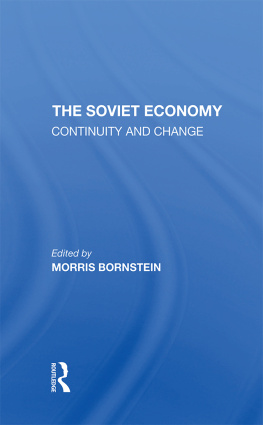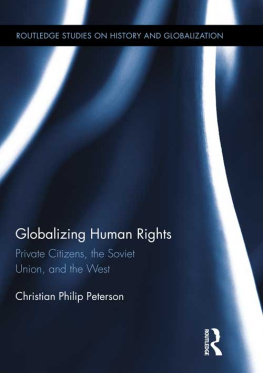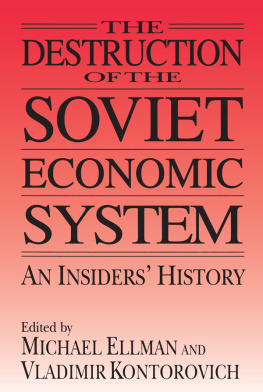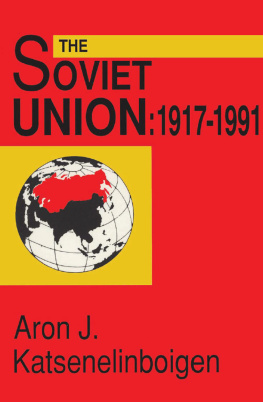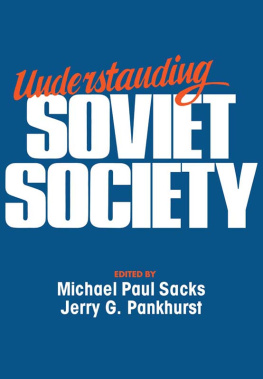Soviet Politics in the 1980s
Westview Replica Editions
The concept of Westview Replica Editions is a response to the continuing crisis in academic and informational publishing. Library budgets for books have been severely curtailed. Ever larger portions of general library budgets are being diverted from the purchase of books and used for data banks, computers, micromedia, and other methods of information retrieval. Interlibrary loan structures further reduce the edition sizes required to satisfy the needs of the scholarly community. Economic pressures on the university presses and the few private scholarly publishing companies have severely limited the capacity of the industry to properly serve the academic and research communities. As a result, many manuscripts dealing with important subjects, often representing the highest level of scholarship, are no longer economically viable publishing projects--or, if accepted for publication, are typically subject to lead times ranging from one to three years.
Westview Replica Editions are our practical solution to the problem. We accept a manuscript in camera-ready form, typed according to our specifications, and move it immediately into the production process. As always, the selection criteria include the importance of the subject, the work's contribution to scholarship, and its insight, originality of thought, and excellence of exposition. The responsibility for editing and proofreading lies with the author or sponsoring institution. We prepare chapter headings and display pages, file for copyright, and obtain Library of Congress Cataloging in Publication Data, A detailed manual contains simple instructions for preparing the final typescript, and our editorial staff is always available to answer questions.
The end result is a book printed on acid-free paper and bound in sturdy library-quality soft covers. We manufacture these books ourselves using equipment that does not require a lengthy make-ready process and that allows us to publish first editions of 300 to 600 copies and to reprint even smaller quantities as needed. Thus, we can produce Replica Editions quickly and can keep even very specialized books in print as long as there is a demand for them.
About the Book and Author
The Soviet Union, in the aftermath of the Brezhnev era, may well stand at a crossroads in its history. According to the authors of this volume, the Chernenko administration and the new generation of political leaders now on the threshold of power must steer through a difficult period in the USSR's international relations, especially where the U.S. is concerned, continuing to assert what they regard as the legitimate Soviet role as a world superpower while coping with an inflexible and aging political system, a stagnant economy, and growing social problems. The contributors provide a careful consideration of the choices confronting the USSR as this new era begins and analyze the paths its leaders may take as they grapple with the challenges of the 1980s.
Helmut Sonnenfeldt, formerly the counselor to then U.S. Secretary of State Henry Kissinger, is currently a guest scholar in international affairs at the Brookings institution.
Soviet Politics in the 1980s
edited by
Helmut Sonnenfeldt
First published 1985 by Westview Press
Published 2019 by Routledge
52 Vanderbilt Avenue, New York, NY 10017
2 Park Square, Milton Park, Abingdon, Oxon OX14 4RN
Routledge is an imprint of the Taylor & Francis Group, an informa business
Copyright 1985 by Taylor & Francis
All rights reserved. No part of this book may be reprinted or reproduced or utilised in any form or by any electronic, mechanical, or other means, now known or hereafter invented, including photocopying and recording, or in any information storage or retrieval system, without permission in writing from the publishers.
Notice:
Product or corporate names may be trademarks or registered trademarks, and are used only for identification and explanation without intent to infringe.
Library of Congress Cataloging in Publication Data
Main entry under title:
Soviet Politics in the 1980s.
(A Westview replica edition)
1. Soviet Union--Politics and government--1953- --Addresses, essays,
lectures. 2. Soviet Union--Economic conditions--1976- --Addresses,
essays, lectures. 3. Soviet Union--Social conditions--1970- --Addresses,
essays, lectures. I. Sonnenfeldt, Helmut, 1926-
DK286.5.S68 1985 947.085'4 84-7486
ISBN 13: 978-0-367-28835-8(hbk)
Helmut Sonnenfeldt
The papers assembled in this volume were originally commissioned in late 1982, in what turned out to be the final weeks of the Brezhnev era. First drafts were then discussed intensively in a series of four one-day conferences in the first half of 1983 in what appeared at the time to be the early stage of an Andropov-led activation of an increasingly stagnant political leadership. The drafts were revised by the authors in the light of specifically prepared comments and of issues raised in give-And-take discussions by other participants in the 1983 conference series. This process of revision and updating occurred during the progressive incapacitation of Andropov but prior to his death and the advent of Konstantin Chernenko as CPSU general secretary in February 1984.
The purpose of the papers, and of the conferences built around them under the sponsorship of the United States Information Agency and the Georgetown University Center for Strategic and International Studies and the Kennan Institute for Advanced Russian Studies in Washington, DC, was to illuminate selected aspects of the evolution of Soviet politics and society and some areas of interaction between the Soviet Union and the West, particularly the United States.
While papers written and discussions conducted in 1982-83, could clearly not avoid a good deal of attention to the leadership succession then under way, the hope was to treat the issues in a broader perspective and longer time frame. This, I believe, was substantially accomplished by the authors, so that the contents of this volume can be said to transcend the personnel changes of the moment. Indeed, an important impression to be derived from these materials is that the underlying issues of Soviet politics in their multifaceted ramifications and the problems faced by the rest of the world in conducting relations with and policies toward the Soviet Union are almost certainly less affected by the particular individuals currently in power in Moscow than is often thought.
Thus, in a sense, these papers constitute an agenda for the Soviet political system, whatever the precise composition of the leadership groups at various levels of the party and state in the 1980s. Undoubtedly, frequent turnover at the top and resulting personnel turbulence in the lower reaches have their impact. Because of the rigid seniority system that prevails in the Soviet Union and the relative stability in leadership politics that came to be a hallmark of the Brezhnev era, deaths and incapacitation have taken a heavy toll in recent years as the average age of the leaders moved ever upward. This phenomenon of personnel turnover can be expected to continue for some time. Indeed, because there has been something of a "long generation" in office, those who move up may have a relatively brief tenure, at least in the highest positions; a more or less stable leadership may thus still take some time to form. How the system can and will grapple with the accumulated problems that face it is in any event among the key questions of the day. But it is compounded by the uncertainties inherent in leadership flux and maneuvering. Dramatic change seems unlikely in these circumstances.



